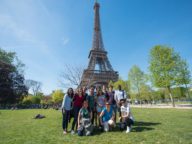[Editor’s note: P2C-Students offers opportunities for young adults to go on mission trips nationally and internationally. We want all people to experience God’s heart for the world. This blog series is one way to discover more about the what, how, and why of #globalmissions.
This article was written by Sel, a member of our global missions team. Sel serves with P2C-Students from Toronto, where she enjoys the diversity of her city, local nature trails, and an abundance of plants in her apartment. She also enjoys experiencing new things, silence, large parties, and hammocking.]
Know what blinds you
In 2006, I went for the first time to an area known as Desert Rain. I remember being on the plane, looking out of the window, and seeing that the land looked dry and sort of like a Settlers of Catan board. I cried, thinking of how the dry land was a representation of the area’s spiritual dryness.
But that became all I could see.
As I entered the country on that first mission trip, I was blinded by a combination of my pride and a narrow focus on the sin of the people and culture. I missed out on seeing the beauty of the country, its people, and how God was already there, even when the majority of people don’t know him. It left me feeling lonely and a little miserable.
This wasn’t the first time I took the wrong posture in missions, nor was it the last.
Take risks in new places
In 2012, I was asked to lead a mission trip to South Asia. I did not want to go to a new place, new people, or new culture. At this point I loved Desert Rain and wanted to go back there instead. But through a series of very specific answered prayer requests, I found myself in a country that I had no interest in, about to lead a mission trip.
I remember the smell of the airport when we landed and how its similarity to other airports made me feel a little at home. On that short-term mission trip, I found myself challenged by the differences, but also captured by the similarities of the people and country to myself and to past mission trip experiences.
I enjoyed the friends I made in the country. I was often blown away by their intelligence, and loved how they were caught up in some of the same TV shows I was watching. I learned to love the friends I made there and the lessons they taught me.
Be humble
One of my closest friends in South Asia believed in karma. Karma is the belief that a person’s actions determine their future fate. I could not understand why anyone would want to believe this.
One time, my friend and I went in circles arguing our differing views and just getting frustrated. I went home, thought about it, and realized that in some ways my friend was right. Yet I was not acknowledging any of those ways in our conversation. My posture toward her needed to shift.
The next time we met up, I apologized for being so forceful with my views, and I told her that I realized that Christianity does show us that we reap what we sow—but adds that Jesus reaped what we sowed so that we could reap what he sowed, and that is being a child of God!
She was a little shocked at my apology and recognition of similarities. Her whole demeanor changed and so did mine, and we were able to have a fuller conversation about Jesus. We were both more willing to listen and see each other, instead of just trying to win the argument.
Be expectant and curious
Over the years, I’ve learned to love and enjoy the world and people as a way of worshipping God. He has shown me to look for him and to find him in his created world.
In Genesis, after God created everything, he declared it “good.” While Adam and Eve’s sin led to the earth being cursed, it is still filled with God’s invisible qualities such as his eternal power and divine nature (Romans 1:20). What I needed to learn was an expectant, curious, and humble posture that would allow me to see these qualities in the cultures I was entering. And as I went on missions trips, I began to learn to do just that.
Look for God in landscapes
The Creator God reveals himself to us in the uniqueness of landscapes, from mountains, to valleys, oceans, villages, and cities alike. While I have been travelling on mission trips, God has used creation to show me what it means to fear him.
I first saw the milky way in Tanzania. It was so beautiful and a little scary. I felt small, and yet the beauty of the thousands upon thousands of stars drew me in. I wanted to look away and look forever at it all at the same time. I realized that God does the same thing. He is so big and beautiful that it can be a little scary thinking about him, and yet his beauty draws us in all the more.
It amazes me that this fallen world can be so beautiful. And yet its beauty cannot compare to God himself. Seeing and enjoying God through his creation reminds me that there is more waiting for us in him.
Find God in cultures
I’ve also encountered God’s presence in the cultures I’ve visited on mission trips. He’s in the beauty of art, in the various tastes of cuisine, in the music, in the dances, and in the eyes, hands, skin, and thoughts of men and women. There is so much to learn and experience, because God is vast!
For example, mosques and temples around the world—in all their architectural beauty—reveal the true Creator who has built minds who can also create. While it does sadden me that people use their creativity to worship false gods, I can still praise the true God for how creative his creatures are!
The Apostle Paul was someone who studied people and cultures well and used it to further the gospel (see Acts 17). We too need to study other cultures with curiosity to see the glory of God in this world. We need to ask God to supply us with faith to believe that his goodness and grace is bigger than we can imagine, touching all creation, culture, thought, and even religion.
Seeing the depravity and the ways in which different cultures reject Christ should also lead us to humility, to see where there is brokenness in ourselves and our own culture.
Notice God’s image in others
Participating in mission trips has helped me see how all humans are made in the image of God. No matter our gender, ethnicity, religious affiliation, or physical, emotional, and mental abilities, all have dignity and inherent value. Humans, both individually and collectively, make up the image of God. I would even go so far to say that every ethnicity and culture is needed to reveal who God is.
God allows this to be true for both the believer and the unbeliever. Every human being can reveal God by showing the goodness of his character when they reflect his kindness, love, sacrifice, joy, and justice.
Learn from everyone
There are people all over the world who behave more like Christ than some Christians. In Desert Rain, I was invited into people’s homes and treated like family even though I just met them a few days before.
I remember being in one home where it was clear they did not have a lot of money, yet they chose to have us over. Meat is expensive, and yet my friend’s grandmother would push the meat into my corner, telling me to “Eat! Eat!”
In another home, the family waited until we had eaten the food and then ate the leftovers. Their hospitality was at a cost to them, and yet they seemed joyful in the sacrifice. That kind of hospitality reveals the hospitality of Jesus. It was costly to him; it cost him his life. Yet, he looked forward to the cross with joy, seeking to welcome us into his family.
Every human has something to teach us of God. As Christians, we need to be humble to learn from those that God has made in his image. Their lives point to the diversity of God, and every human being may have something to teach us about him, even as we share the good news about Jesus with them.
Choose your posture
Having a posture of enjoying the presence of God in his creation has made missions a lot more fun, though looking for God takes work. It takes choosing to be a learner, and can be very humbling.
To truly see God’s work and presence in the world, I needed a change of heart. I needed to see that my love is often too small.
God constantly invites me to share in his heart for the nations, and I believe it’s an invitation for us all. There are times where I have found it hard to see God, and so I’ll ask him to show himself. I’ll ask him to allow me to taste, touch, see, smell, and understand the work he is doing, so that I can worship him and better love the world.
How might God be inviting you to share his heart for the nations?
What would it look like for you to see him in your daily life?
How can you cultivate an eye for seeing gospel truths around you?
"*" indicates required fields
Share this!
About the Author





